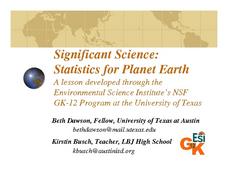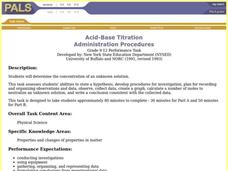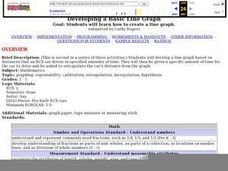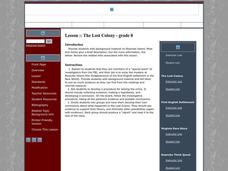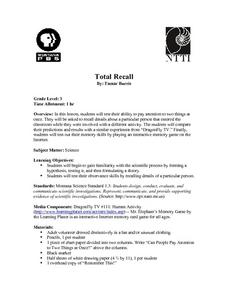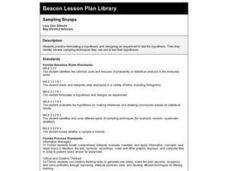Curated OER
Prediction
Students' recognize the various roles of predicting in science. Students' practice making and interpreting predictions; experimenting to test their hypotheses; and refine their predictions based on observation and experimentation....
Curated OER
Significant Science: Statistics for Planet Earth
Ninth graders discover how statistics are used to interpret results of scientific experiments. Students write hypotheses and test the hypotheses by collecting data and organizing the data. Students graph their data to produce a visual....
Curated OER
Catapults
Students are introduced to the concept of a catapult and how it is used with the help of a media presentation. They use catapults in a large, open area and record the distances objects travel. Students use the scientific method while...
Curated OER
8th Grade Earth Science: Density
Students draw upon their prior knowledge of the density of water and practice writing a hypothesis, making an observation, and analyzing data while watching a density demonstration.
Curated OER
"Eggs-perimenting" Fun
Students dissolve salt into water, place an egg into a glass of salt water, observe and record observations, make a scientific hypothesis, summarize what they studied from this hands-on experiment. They share their ideas and findings...
Curated OER
Acid-Base Titration
Students determine the concentration of an unknown solution. This task assesses students' abilities to state hypothesis, develop procedures for investigation, plan for recording and organizing observations and data, collect data, create...
Curated OER
Friction of a Block Weight
Fifth graders hypothesize and design an experiment to study the relationship between a block weight and the number of washers it takes to pull a block across various surfaces. Students graph results and apply their findings to a...
Curated OER
RCX Car Line Graph
Students develop a line graph based on distances that an RCX car drives in specified amounts of time. They then are given a specific amount of time for the car to drive and be asked to extrapolate the car's distance from the graph.
Curated OER
Hypothesize This!
Students role play scientists to prove a hypotheses. They determine whether or not walruses stay warmer in water or in air. Students also determine in which environment they lose more body heat.
Curated OER
Predicting: Making a Hypothesis
Students analyze information from various sources to create a hypothesis about the origin of a family artifact. Students create a hypothesis about the origin of the item and write a paragraph explaining why they believe the hypothesis is...
Curated OER
Shining the Light on Skin
Students investigate the relationships between certain environmental factors and levels of exposure to sunlight. The variables of location, time of year, and day, and the weather which affect the intensity of the sun are explored in this...
Curated OER
Building a Pill Bug Palace
Students make "pets" of isopods (potato bugs) to determine their preferred environment and food sources. They record their results on a bar graph and in a scientific report.
Curated OER
Explosive Ideas!
Students explore the layers of the Earth and the dynamic changes that they cause on Earth's surface. Volcanoes and earthquakes become the focus of the lesson plan as the Oregon State quarter and its Crater Lake images are linked to the...
Curated OER
The Lost Colony
Eighth graders act as FBI investigators to "solve" the mystery of the Lost Colony of Roanoke Island. They decide how they would investigate the situation and develop their own conclusions of what happened these colonists.
Curated OER
Science: Total Recall
Third graders attempt to recall details about a person entering the classroom while they are involved in another activity. They test their skills of observation and memories by playing an interactive memory game.
Curated OER
Oxygen Levels and Aquatic Plants and Animals
Learners design an experiment to test the effects of a change in the amount of dissolved oxygen of water on aquatic plants and animals. Questions are offered for exploration and experiment design. Results are tabulated and conclusions...
Curated OER
Making Hypotheses
Fourth graders practice making hypotheses about what they believe occur as they perform an osmosis experiment in class. This experiment is designed to illustrate how important it is to make an accurate hypothesis.
Curated OER
Lab Report Template
Students write a paragraph (complete sentences) which explains what they did in the lab.
Curated OER
Sampling Snoops
Students practice formulating a hypothesis and designing an experiment to test the hypothesis. They identify several sampling techniques they can use to test their hypotheses.
Curated OER
Bubonic Plague Role Play
Students, by doing the role play, develop, in groups of 3 or 4, a hypothesis for the cause of the Bubonic Plague during the Renaissance.
Curated OER
Adopt An Animal
Students view slides of pictures of rare animals and make predictions about them based on the characteristics they see. In this animals lesson plan, students then research one of the animals and present their findings to the class.
Curated OER
Scientific Method Hypothesis Adjectives Worksheet
In this scientific method and adjectives activity, students analyze a picture of a child studying a science book. Students write 6 adjectives that describe the scientific method or a hypothesis. Students use each adjective in a sentence.
Curated OER
Making Connections
In this experimentation worksheet, students review the steps of setting up an experiment, determining the correct procedure and analyzing the data. This worksheet has 23 fill in the blank questions.
Curated OER
Investigations
In this investigations worksheet, students describe the investigative steps: recall, explain, results, and uncertainties. This worksheet has 5 short answer questions.



